Analysis of Plastic Waste Management at QUT: A Report
VerifiedAdded on 2022/10/19
|6
|1245
|37
Report
AI Summary
This report investigates plastic waste as a major concern in the modern world, analyzing its adverse effects within the QUT environment. The research, based on a questionnaire, reveals high plastic consumption despite public awareness of its non-biodegradable nature and environmental impact. The findings highlight the need for greater awareness, education, and eco-friendly alternatives. The report discusses the significance of findings in relation to existing research and focuses on awareness, current practices, and barriers to reducing plastic waste. Recommendations include QUT spreading awareness about plastic's adverse effects and imparting education on plastic pollution. Further research is suggested to understand challenges in recycling and derive better solutions to reduce plastic waste. The report underscores the importance of individual action and highlights the need for holistic solutions to reduce plastic waste.
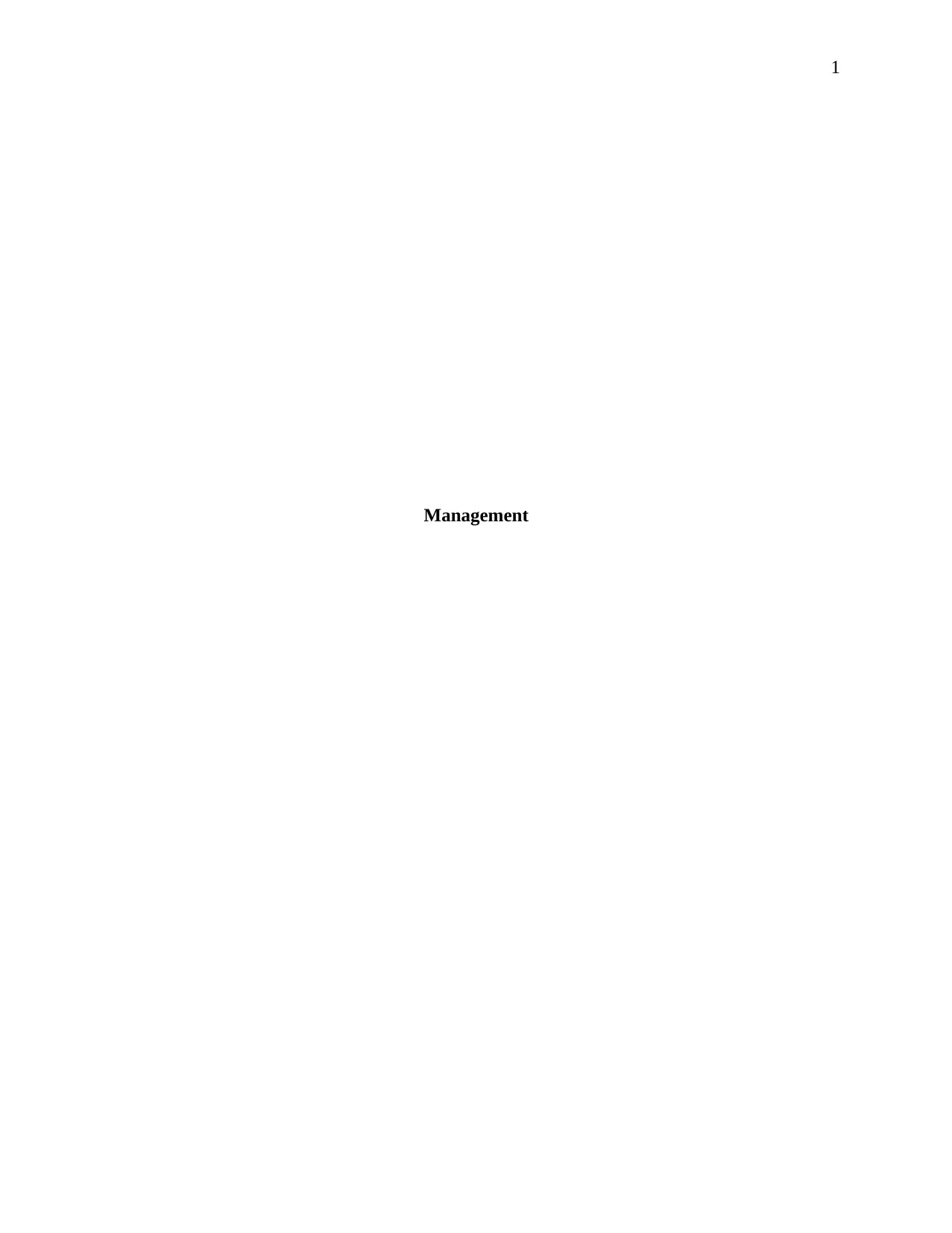
1
Management
Management
Paraphrase This Document
Need a fresh take? Get an instant paraphrase of this document with our AI Paraphraser
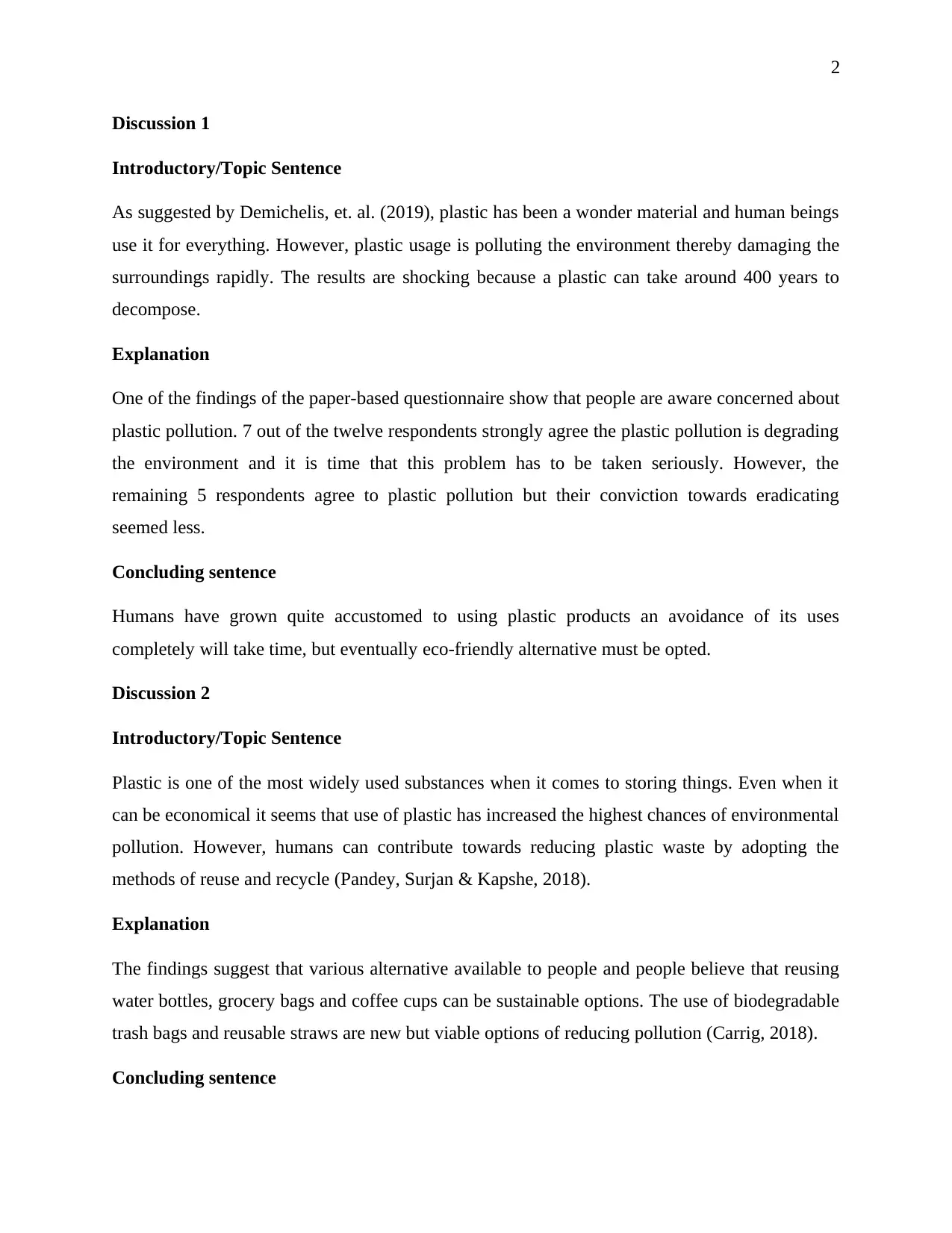
2
Discussion 1
Introductory/Topic Sentence
As suggested by Demichelis, et. al. (2019), plastic has been a wonder material and human beings
use it for everything. However, plastic usage is polluting the environment thereby damaging the
surroundings rapidly. The results are shocking because a plastic can take around 400 years to
decompose.
Explanation
One of the findings of the paper-based questionnaire show that people are aware concerned about
plastic pollution. 7 out of the twelve respondents strongly agree the plastic pollution is degrading
the environment and it is time that this problem has to be taken seriously. However, the
remaining 5 respondents agree to plastic pollution but their conviction towards eradicating
seemed less.
Concluding sentence
Humans have grown quite accustomed to using plastic products an avoidance of its uses
completely will take time, but eventually eco-friendly alternative must be opted.
Discussion 2
Introductory/Topic Sentence
Plastic is one of the most widely used substances when it comes to storing things. Even when it
can be economical it seems that use of plastic has increased the highest chances of environmental
pollution. However, humans can contribute towards reducing plastic waste by adopting the
methods of reuse and recycle (Pandey, Surjan & Kapshe, 2018).
Explanation
The findings suggest that various alternative available to people and people believe that reusing
water bottles, grocery bags and coffee cups can be sustainable options. The use of biodegradable
trash bags and reusable straws are new but viable options of reducing pollution (Carrig, 2018).
Concluding sentence
Discussion 1
Introductory/Topic Sentence
As suggested by Demichelis, et. al. (2019), plastic has been a wonder material and human beings
use it for everything. However, plastic usage is polluting the environment thereby damaging the
surroundings rapidly. The results are shocking because a plastic can take around 400 years to
decompose.
Explanation
One of the findings of the paper-based questionnaire show that people are aware concerned about
plastic pollution. 7 out of the twelve respondents strongly agree the plastic pollution is degrading
the environment and it is time that this problem has to be taken seriously. However, the
remaining 5 respondents agree to plastic pollution but their conviction towards eradicating
seemed less.
Concluding sentence
Humans have grown quite accustomed to using plastic products an avoidance of its uses
completely will take time, but eventually eco-friendly alternative must be opted.
Discussion 2
Introductory/Topic Sentence
Plastic is one of the most widely used substances when it comes to storing things. Even when it
can be economical it seems that use of plastic has increased the highest chances of environmental
pollution. However, humans can contribute towards reducing plastic waste by adopting the
methods of reuse and recycle (Pandey, Surjan & Kapshe, 2018).
Explanation
The findings suggest that various alternative available to people and people believe that reusing
water bottles, grocery bags and coffee cups can be sustainable options. The use of biodegradable
trash bags and reusable straws are new but viable options of reducing pollution (Carrig, 2018).
Concluding sentence
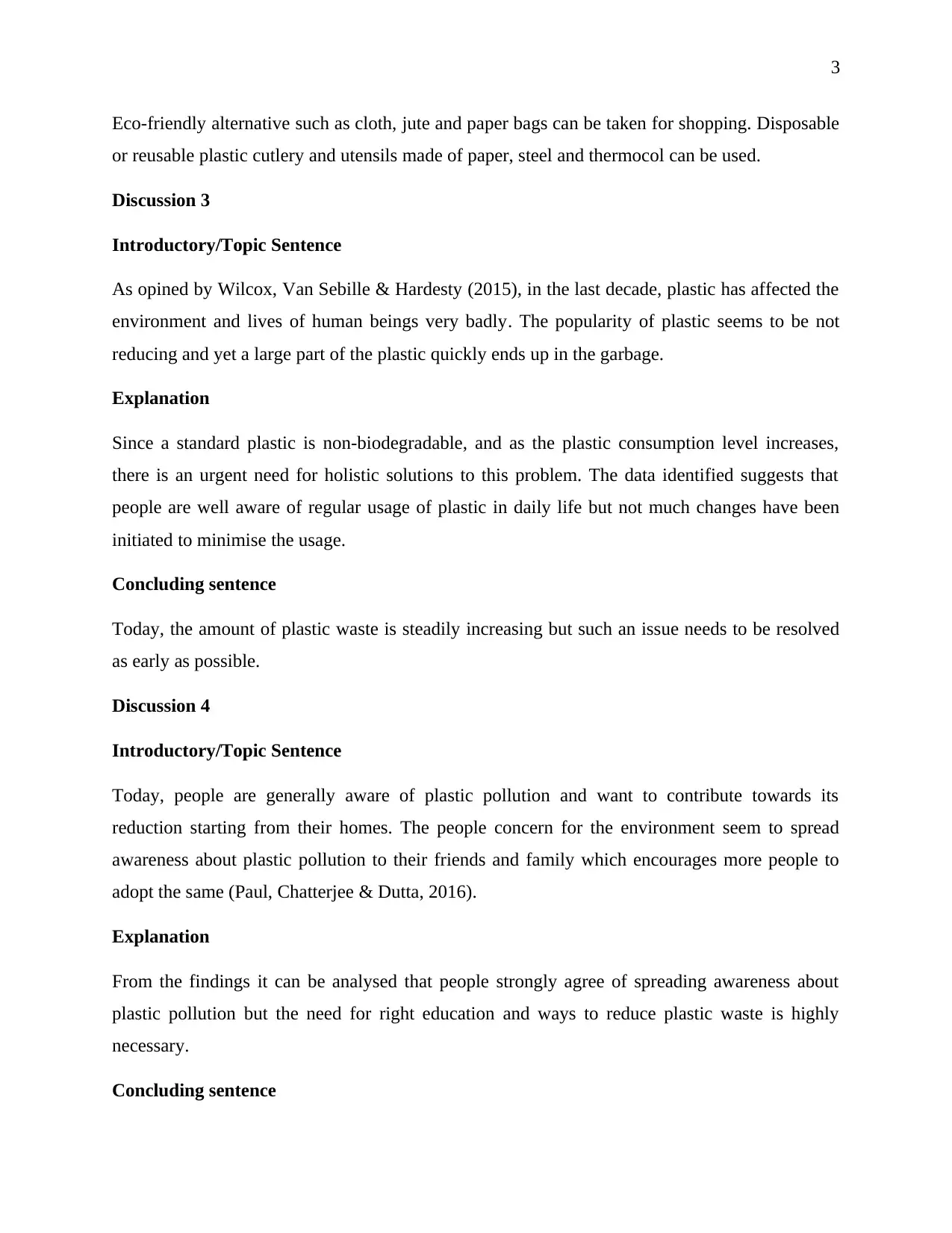
3
Eco-friendly alternative such as cloth, jute and paper bags can be taken for shopping. Disposable
or reusable plastic cutlery and utensils made of paper, steel and thermocol can be used.
Discussion 3
Introductory/Topic Sentence
As opined by Wilcox, Van Sebille & Hardesty (2015), in the last decade, plastic has affected the
environment and lives of human beings very badly. The popularity of plastic seems to be not
reducing and yet a large part of the plastic quickly ends up in the garbage.
Explanation
Since a standard plastic is non-biodegradable, and as the plastic consumption level increases,
there is an urgent need for holistic solutions to this problem. The data identified suggests that
people are well aware of regular usage of plastic in daily life but not much changes have been
initiated to minimise the usage.
Concluding sentence
Today, the amount of plastic waste is steadily increasing but such an issue needs to be resolved
as early as possible.
Discussion 4
Introductory/Topic Sentence
Today, people are generally aware of plastic pollution and want to contribute towards its
reduction starting from their homes. The people concern for the environment seem to spread
awareness about plastic pollution to their friends and family which encourages more people to
adopt the same (Paul, Chatterjee & Dutta, 2016).
Explanation
From the findings it can be analysed that people strongly agree of spreading awareness about
plastic pollution but the need for right education and ways to reduce plastic waste is highly
necessary.
Concluding sentence
Eco-friendly alternative such as cloth, jute and paper bags can be taken for shopping. Disposable
or reusable plastic cutlery and utensils made of paper, steel and thermocol can be used.
Discussion 3
Introductory/Topic Sentence
As opined by Wilcox, Van Sebille & Hardesty (2015), in the last decade, plastic has affected the
environment and lives of human beings very badly. The popularity of plastic seems to be not
reducing and yet a large part of the plastic quickly ends up in the garbage.
Explanation
Since a standard plastic is non-biodegradable, and as the plastic consumption level increases,
there is an urgent need for holistic solutions to this problem. The data identified suggests that
people are well aware of regular usage of plastic in daily life but not much changes have been
initiated to minimise the usage.
Concluding sentence
Today, the amount of plastic waste is steadily increasing but such an issue needs to be resolved
as early as possible.
Discussion 4
Introductory/Topic Sentence
Today, people are generally aware of plastic pollution and want to contribute towards its
reduction starting from their homes. The people concern for the environment seem to spread
awareness about plastic pollution to their friends and family which encourages more people to
adopt the same (Paul, Chatterjee & Dutta, 2016).
Explanation
From the findings it can be analysed that people strongly agree of spreading awareness about
plastic pollution but the need for right education and ways to reduce plastic waste is highly
necessary.
Concluding sentence
⊘ This is a preview!⊘
Do you want full access?
Subscribe today to unlock all pages.

Trusted by 1+ million students worldwide
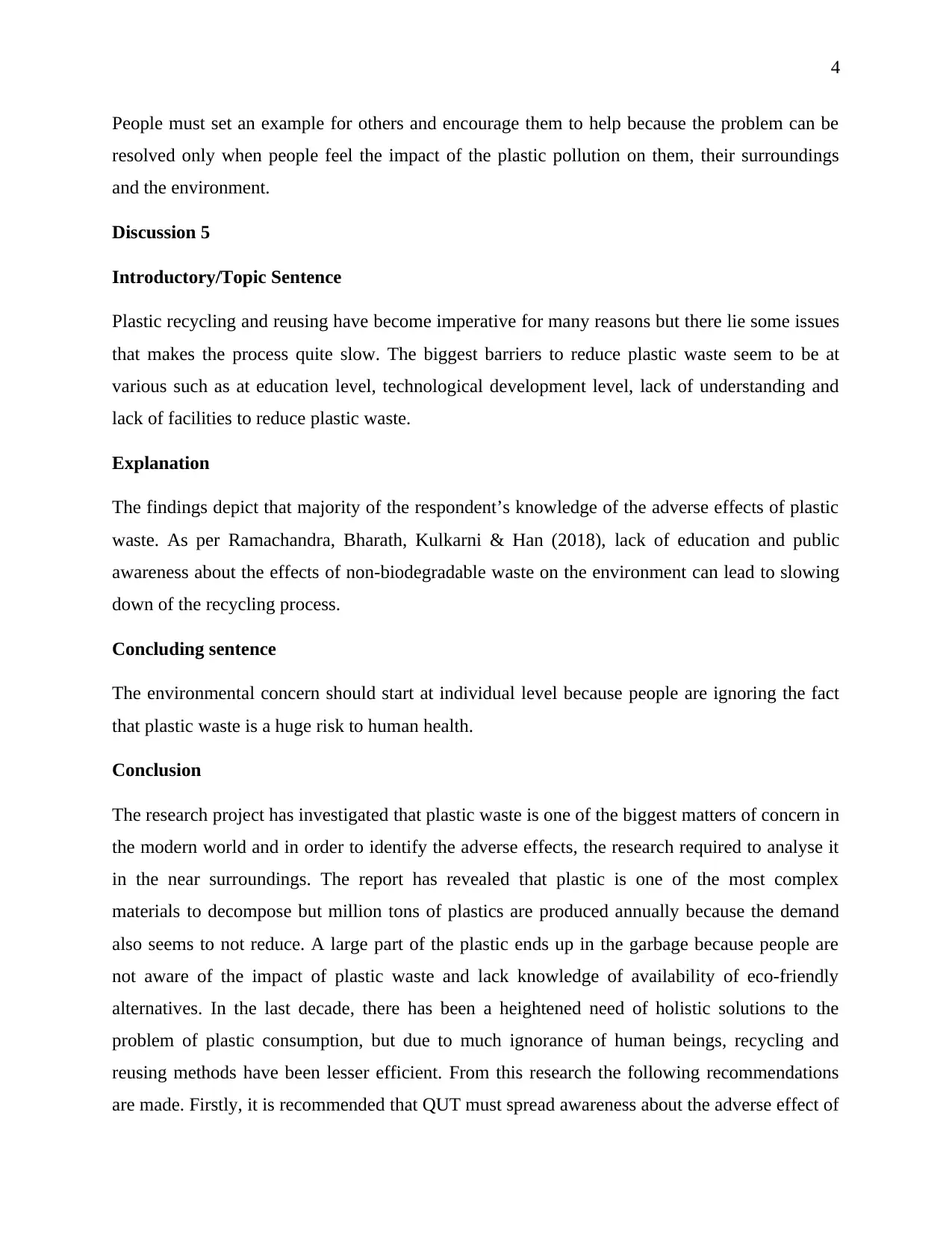
4
People must set an example for others and encourage them to help because the problem can be
resolved only when people feel the impact of the plastic pollution on them, their surroundings
and the environment.
Discussion 5
Introductory/Topic Sentence
Plastic recycling and reusing have become imperative for many reasons but there lie some issues
that makes the process quite slow. The biggest barriers to reduce plastic waste seem to be at
various such as at education level, technological development level, lack of understanding and
lack of facilities to reduce plastic waste.
Explanation
The findings depict that majority of the respondent’s knowledge of the adverse effects of plastic
waste. As per Ramachandra, Bharath, Kulkarni & Han (2018), lack of education and public
awareness about the effects of non-biodegradable waste on the environment can lead to slowing
down of the recycling process.
Concluding sentence
The environmental concern should start at individual level because people are ignoring the fact
that plastic waste is a huge risk to human health.
Conclusion
The research project has investigated that plastic waste is one of the biggest matters of concern in
the modern world and in order to identify the adverse effects, the research required to analyse it
in the near surroundings. The report has revealed that plastic is one of the most complex
materials to decompose but million tons of plastics are produced annually because the demand
also seems to not reduce. A large part of the plastic ends up in the garbage because people are
not aware of the impact of plastic waste and lack knowledge of availability of eco-friendly
alternatives. In the last decade, there has been a heightened need of holistic solutions to the
problem of plastic consumption, but due to much ignorance of human beings, recycling and
reusing methods have been lesser efficient. From this research the following recommendations
are made. Firstly, it is recommended that QUT must spread awareness about the adverse effect of
People must set an example for others and encourage them to help because the problem can be
resolved only when people feel the impact of the plastic pollution on them, their surroundings
and the environment.
Discussion 5
Introductory/Topic Sentence
Plastic recycling and reusing have become imperative for many reasons but there lie some issues
that makes the process quite slow. The biggest barriers to reduce plastic waste seem to be at
various such as at education level, technological development level, lack of understanding and
lack of facilities to reduce plastic waste.
Explanation
The findings depict that majority of the respondent’s knowledge of the adverse effects of plastic
waste. As per Ramachandra, Bharath, Kulkarni & Han (2018), lack of education and public
awareness about the effects of non-biodegradable waste on the environment can lead to slowing
down of the recycling process.
Concluding sentence
The environmental concern should start at individual level because people are ignoring the fact
that plastic waste is a huge risk to human health.
Conclusion
The research project has investigated that plastic waste is one of the biggest matters of concern in
the modern world and in order to identify the adverse effects, the research required to analyse it
in the near surroundings. The report has revealed that plastic is one of the most complex
materials to decompose but million tons of plastics are produced annually because the demand
also seems to not reduce. A large part of the plastic ends up in the garbage because people are
not aware of the impact of plastic waste and lack knowledge of availability of eco-friendly
alternatives. In the last decade, there has been a heightened need of holistic solutions to the
problem of plastic consumption, but due to much ignorance of human beings, recycling and
reusing methods have been lesser efficient. From this research the following recommendations
are made. Firstly, it is recommended that QUT must spread awareness about the adverse effect of
Paraphrase This Document
Need a fresh take? Get an instant paraphrase of this document with our AI Paraphraser
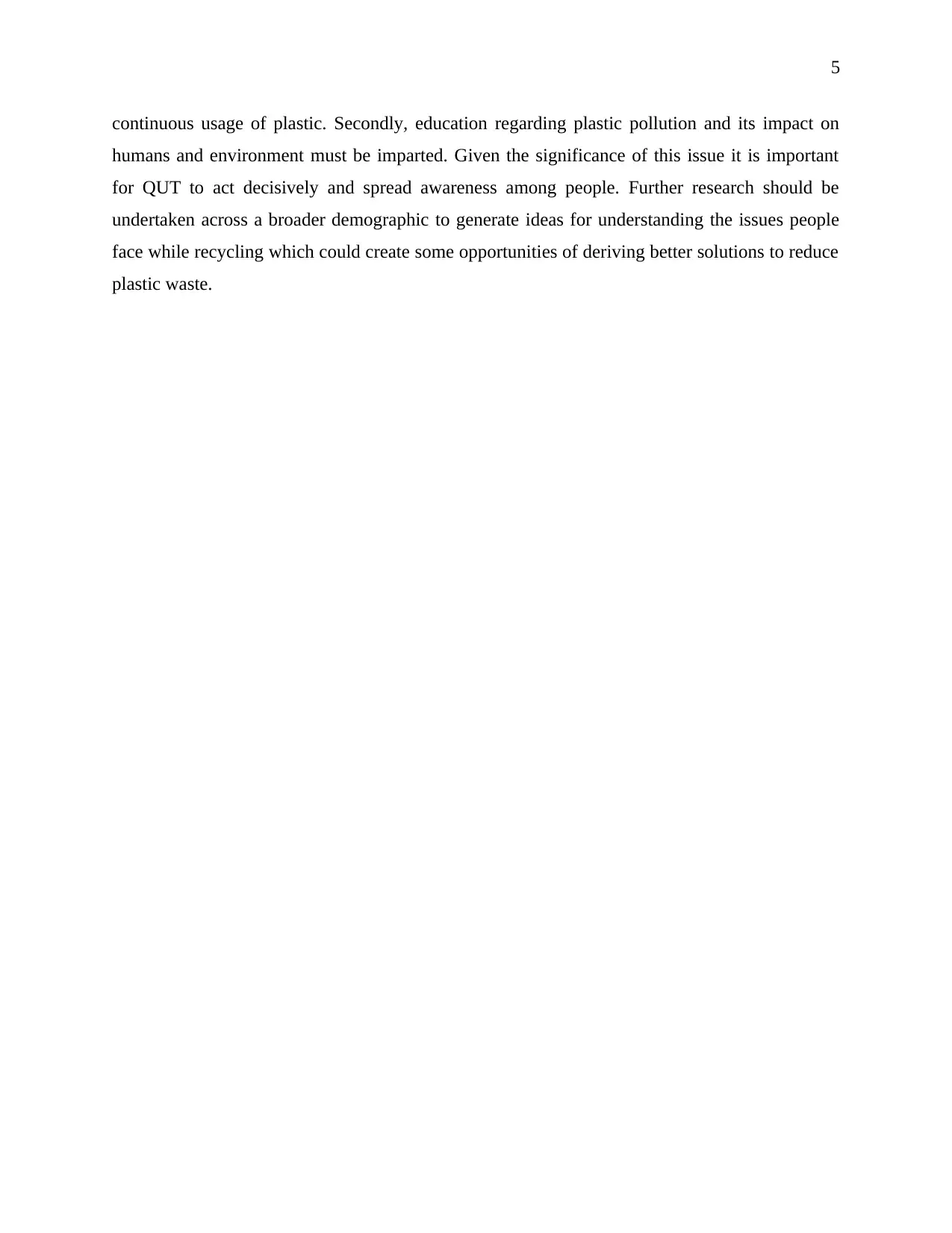
5
continuous usage of plastic. Secondly, education regarding plastic pollution and its impact on
humans and environment must be imparted. Given the significance of this issue it is important
for QUT to act decisively and spread awareness among people. Further research should be
undertaken across a broader demographic to generate ideas for understanding the issues people
face while recycling which could create some opportunities of deriving better solutions to reduce
plastic waste.
continuous usage of plastic. Secondly, education regarding plastic pollution and its impact on
humans and environment must be imparted. Given the significance of this issue it is important
for QUT to act decisively and spread awareness among people. Further research should be
undertaken across a broader demographic to generate ideas for understanding the issues people
face while recycling which could create some opportunities of deriving better solutions to reduce
plastic waste.
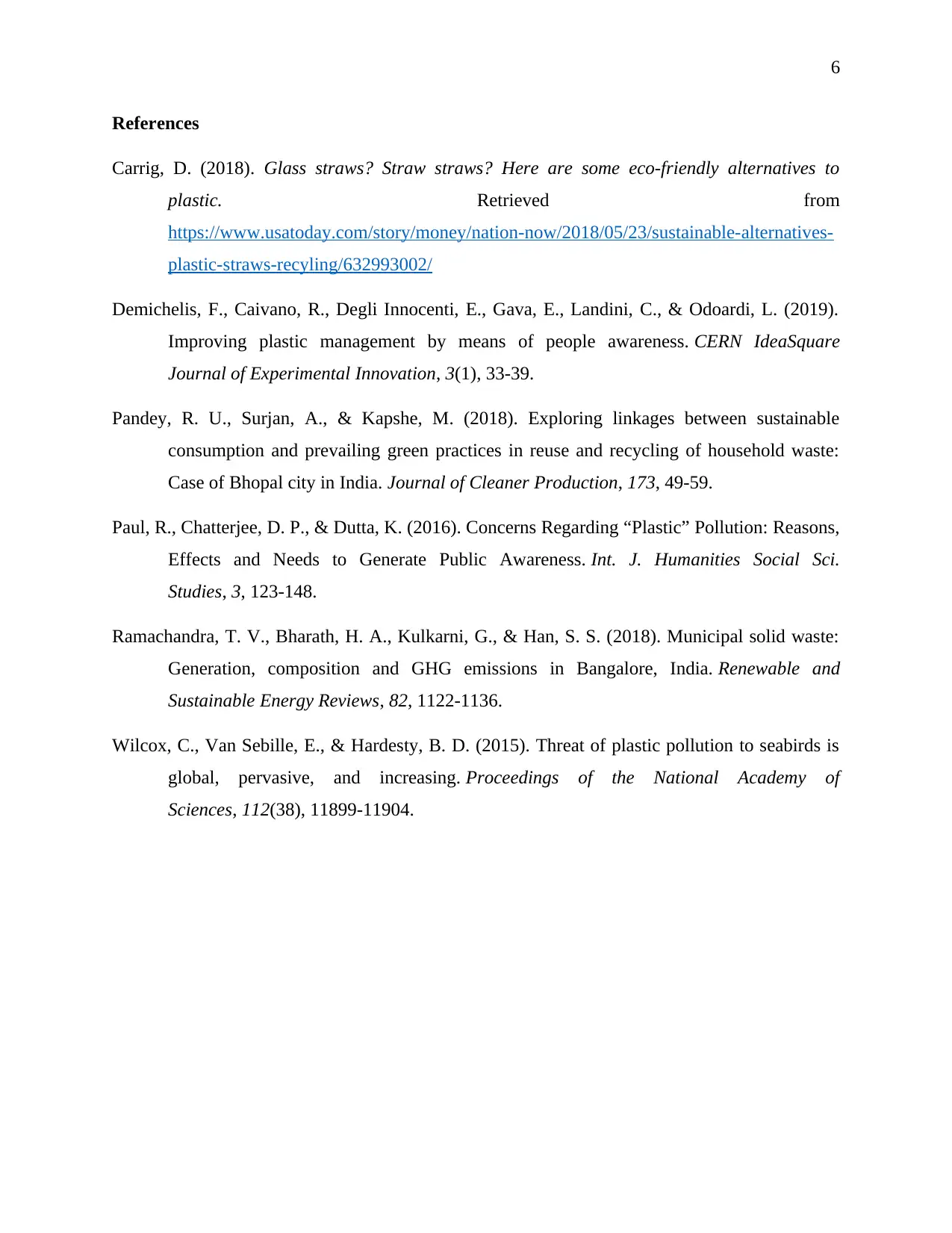
6
References
Carrig, D. (2018). Glass straws? Straw straws? Here are some eco-friendly alternatives to
plastic. Retrieved from
https://www.usatoday.com/story/money/nation-now/2018/05/23/sustainable-alternatives-
plastic-straws-recyling/632993002/
Demichelis, F., Caivano, R., Degli Innocenti, E., Gava, E., Landini, C., & Odoardi, L. (2019).
Improving plastic management by means of people awareness. CERN IdeaSquare
Journal of Experimental Innovation, 3(1), 33-39.
Pandey, R. U., Surjan, A., & Kapshe, M. (2018). Exploring linkages between sustainable
consumption and prevailing green practices in reuse and recycling of household waste:
Case of Bhopal city in India. Journal of Cleaner Production, 173, 49-59.
Paul, R., Chatterjee, D. P., & Dutta, K. (2016). Concerns Regarding “Plastic” Pollution: Reasons,
Effects and Needs to Generate Public Awareness. Int. J. Humanities Social Sci.
Studies, 3, 123-148.
Ramachandra, T. V., Bharath, H. A., Kulkarni, G., & Han, S. S. (2018). Municipal solid waste:
Generation, composition and GHG emissions in Bangalore, India. Renewable and
Sustainable Energy Reviews, 82, 1122-1136.
Wilcox, C., Van Sebille, E., & Hardesty, B. D. (2015). Threat of plastic pollution to seabirds is
global, pervasive, and increasing. Proceedings of the National Academy of
Sciences, 112(38), 11899-11904.
References
Carrig, D. (2018). Glass straws? Straw straws? Here are some eco-friendly alternatives to
plastic. Retrieved from
https://www.usatoday.com/story/money/nation-now/2018/05/23/sustainable-alternatives-
plastic-straws-recyling/632993002/
Demichelis, F., Caivano, R., Degli Innocenti, E., Gava, E., Landini, C., & Odoardi, L. (2019).
Improving plastic management by means of people awareness. CERN IdeaSquare
Journal of Experimental Innovation, 3(1), 33-39.
Pandey, R. U., Surjan, A., & Kapshe, M. (2018). Exploring linkages between sustainable
consumption and prevailing green practices in reuse and recycling of household waste:
Case of Bhopal city in India. Journal of Cleaner Production, 173, 49-59.
Paul, R., Chatterjee, D. P., & Dutta, K. (2016). Concerns Regarding “Plastic” Pollution: Reasons,
Effects and Needs to Generate Public Awareness. Int. J. Humanities Social Sci.
Studies, 3, 123-148.
Ramachandra, T. V., Bharath, H. A., Kulkarni, G., & Han, S. S. (2018). Municipal solid waste:
Generation, composition and GHG emissions in Bangalore, India. Renewable and
Sustainable Energy Reviews, 82, 1122-1136.
Wilcox, C., Van Sebille, E., & Hardesty, B. D. (2015). Threat of plastic pollution to seabirds is
global, pervasive, and increasing. Proceedings of the National Academy of
Sciences, 112(38), 11899-11904.
⊘ This is a preview!⊘
Do you want full access?
Subscribe today to unlock all pages.

Trusted by 1+ million students worldwide
1 out of 6
Related Documents
Your All-in-One AI-Powered Toolkit for Academic Success.
+13062052269
info@desklib.com
Available 24*7 on WhatsApp / Email
![[object Object]](/_next/static/media/star-bottom.7253800d.svg)
Unlock your academic potential
Copyright © 2020–2026 A2Z Services. All Rights Reserved. Developed and managed by ZUCOL.





